Roll with it Get your bowl on, Belgian style, with rolle bolle
Read this article for free:
or
Already have an account? Log in here »
To continue reading, please subscribe:
Monthly Digital Subscription
$1 per week for 24 weeks*
- Enjoy unlimited reading on winnipegfreepress.com
- Read the E-Edition, our digital replica newspaper
- Access News Break, our award-winning app
- Play interactive puzzles
*Billed as $4.00 plus GST every four weeks. After 24 weeks, price increases to the regular rate of $19.95 plus GST every four weeks. Offer available to new and qualified returning subscribers only. Cancel any time.
Monthly Digital Subscription
$4.99/week*
- Enjoy unlimited reading on winnipegfreepress.com
- Read the E-Edition, our digital replica newspaper
- Access News Break, our award-winning app
- Play interactive puzzles
*Billed as $19.95 plus GST every four weeks. Cancel any time.
To continue reading, please subscribe:
Add Free Press access to your Brandon Sun subscription for only an additional
$1 for the first 4 weeks*
*Your next subscription payment will increase by $1.00 and you will be charged $16.99 plus GST for four weeks. After four weeks, your payment will increase to $23.99 plus GST every four weeks.
Read unlimited articles for free today:
or
Already have an account? Log in here »
Hey there, time traveller!
This article was published 17/02/2024 (721 days ago), so information in it may no longer be current.
Before we begin, we would like to formally apologize to Free Press photographer John Woods, who recently risked life, limb and his lower extremities to snap pics of yours truly trying his luck at rolle bolle, also called Belgian bowling, a sporting activity that’s been called a cross between bocce and horseshoes.
Tuesdays are bowling nights at Winnipeg’s Belgian Club, outdoors during the summer months and indoors once the snow starts to fly. Having been told I wouldn’t be permitted to leave the Provencher Avenue locale without giving rolle bolle (rhymes with roly-poly) a try, there I was, cradling a vulcanized-rubber object shaped like an oversized hockey puck in my right hand, taking dead aim at a wooden stake planted in a walled-off, dirt-packed playing surface, some eight metres away.
JOHN WOODS / WINNIPEG FREE PRESS Much like curling, a measuring device is sometimes utilized to determine which bolle is closest to the target. 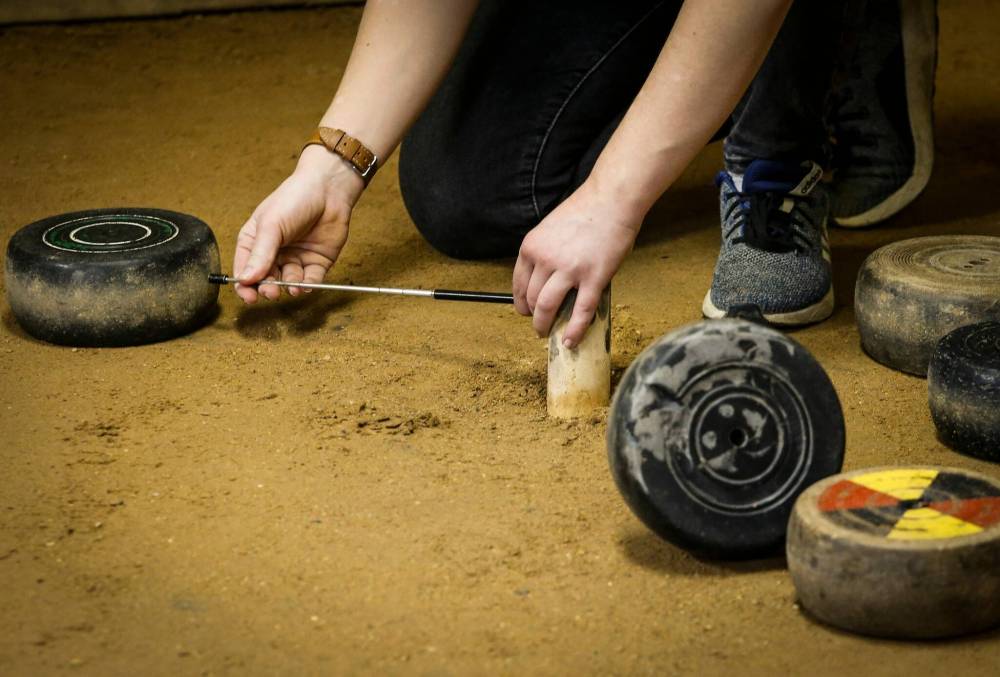
Because the Belgian Club’s pair of basement alleys are purposely concave, I’d been coached to start the bolle well left of the target area, the goal being to have it curve back and come to a rest, as close to the stake as possible. Problem was, my initial throw was overly aggressive, which caused the bolle to careen into John’s ankle, much to the amusement of my fellow participants. (Did I mention bolles, which are ordered from a manufacturer in the U.S., weigh between five and eight pounds each?)
JOHN WOODS / WINNIPEG FREE PRESS Belgian beers and bolles tend to go hand-in-hand at Tuesday Night Bowlers events.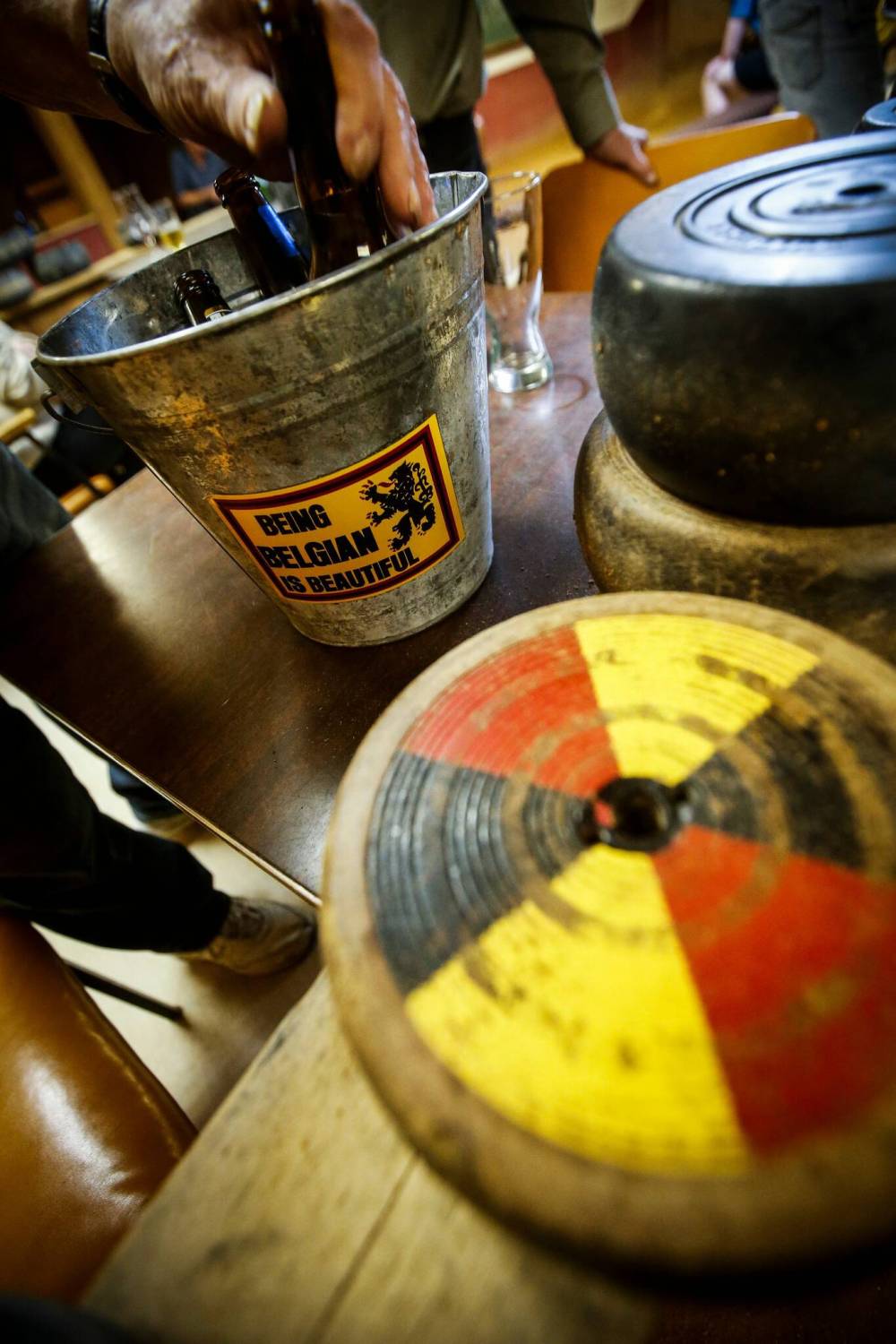
At least I hadn’t destroyed my colleague’s camera, bellowed one fellow. Perhaps I’d do better with a drink under my belt, roared another, holding out a beer.
After the ribbing subsided, a more seasoned bowler offered a few tips, telling me to slow down my delivery, and allow the wheel-like bolle’s steady, rumbling rotation to do most of the work. I followed suit, and not only did I spare John a matching bruise, the bolle hooked as predicted, before teetering… tottering… then coming to rest on its side, inches from the mark.
Not bad for a beginner, I announced proudly, before an opposing player fired his bolle directly into mine, dislodging it in the same manner curlers expertly remove rocks from the rings.
No hard feelings, he remarked. That’s just the way the bolle bounces.
“Hey, everybody, they want to know how long bowling’s been going on, here at the club,” shouts Irene Pines, the person responsible for registering players, typically between 20 and 30, before dividing them into teams for the night, by randomly pulling names out of a hat.
A woman yells back that her late grandfather used to bowl there regularly, and that he’d once told her the weekly, open-to-the-public gatherings date back to when the Belgian Club opened, in 1905.
“Mind you,” pipes in a third person, “Belgian bowling has been around a lot longer than that.”
According to internet sources, rolle bolle was invented in Flanders, a region in northern Belgium, in the early 19th century. It was gradually introduced to other pockets of the world, mostly Manitoba, Michigan, Illinois, Iowa and Minnesota, by Flemish immigrants.
JOHN WOODS / WINNIPEG FREE PRESS Twenty to 30 players regularly show up on Tuesday nights to bowl at the Belgian Club.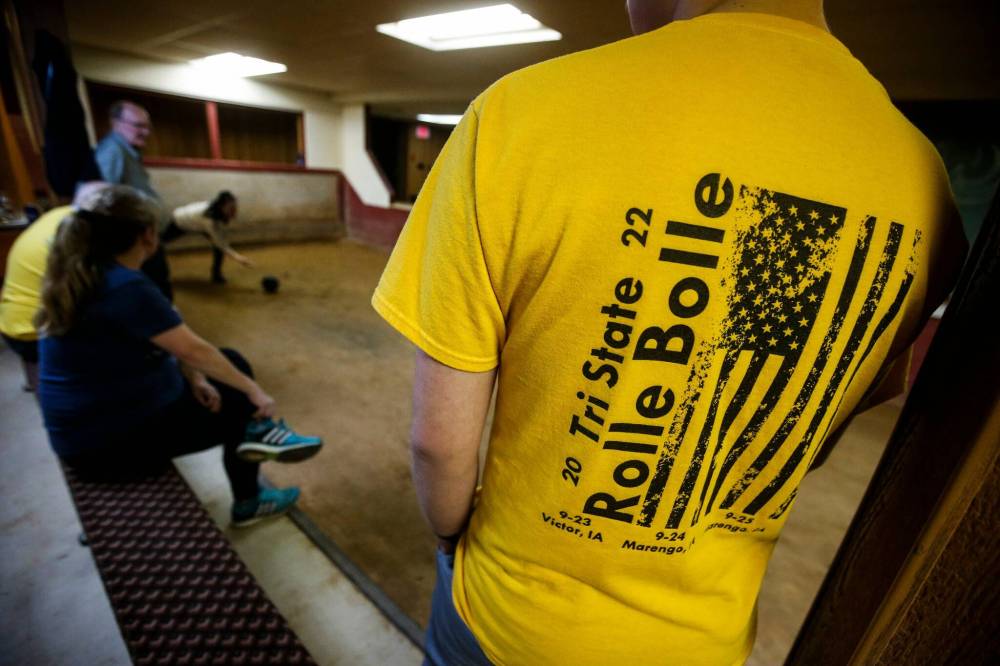
The rules are fairly straightforward. Players from opposing squads take turns throwing one bolle each, per round, after which points are awarded to the team whose bolle — or bolles — ended up closest to the stake. The first team to reach a set number of points — at the Belgian Club it’s 10, tracked on a weathered signboard — is declared the victor.
Thirty years ago, Pines, who is of Belgian descent, was bringing her daughter to the St. Boniface club every Tuesday night, for dance practice ahead of Folklorama. Even a parent can only watch the same routine so much before needing a break, she says with a chuckle, and one evening she wandered outside, where she noticed a few dozen men and women rolling what looked like wheels of cheese in an area adjacent to the parking lot.
JOHN WOODS / WINNIPEG FREE PRESS Leon Lavich, centre, and Alfred, left, and Grace Labossiere, watch Hannah Wolchock's shot during the Tuesday Night Bowlers league at the Belgian Bowling alley in the basement of the Belgian Club.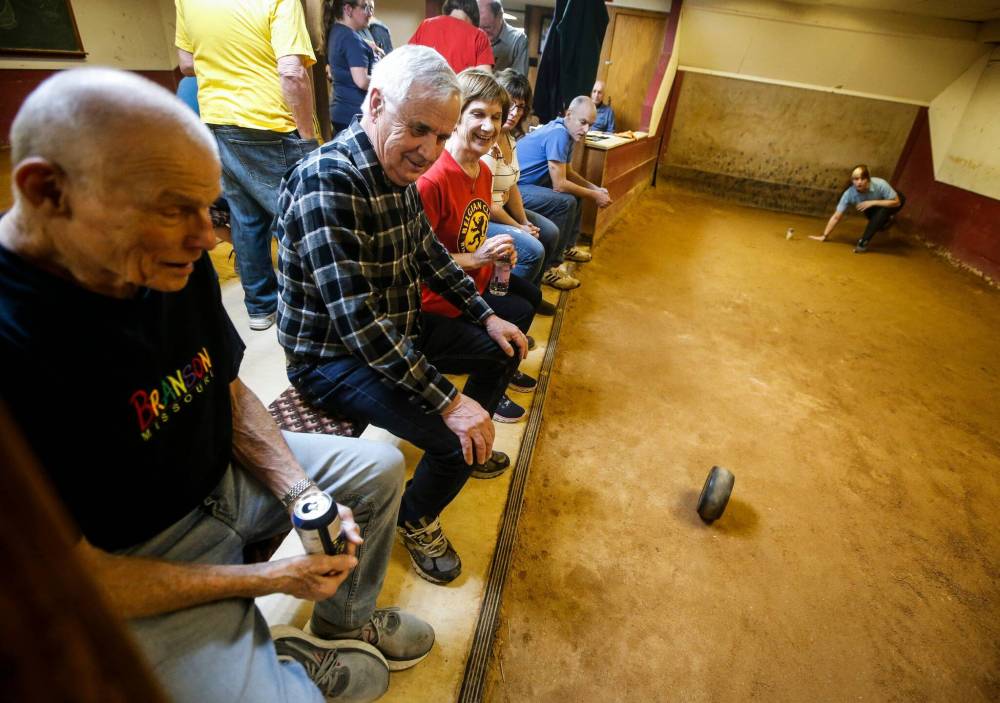
From the sound of things, everybody was having a blast. She moved over, to get a closer look. The next thing she knew, she had been assigned to a team on one of four mud-and-gravel alleys. Pines enjoyed herself immensely, and continued to arrive like clockwork every Tuesday that summer and fall, after her daughter’s weekly rehearsals ceased.
“Unless I’m out of town, I haven’t missed too many bowling nights, since then,” she says, standing next to her brother Albert and sister Leona, both of whom are accomplished bowlers, as well. “To me, it’s good exercise, plus it’s one of those things you can play your whole life, like golf.”
JOHN WOODS / WINNIPEG FREE PRESS Josh Wolchock, from left, Lisa Boone, George DeSerranno and Albert Delbaere check out the action during the Tuesday Night Bowlers league at the Belgian Bowling alley in the basement of the Belgian Club. 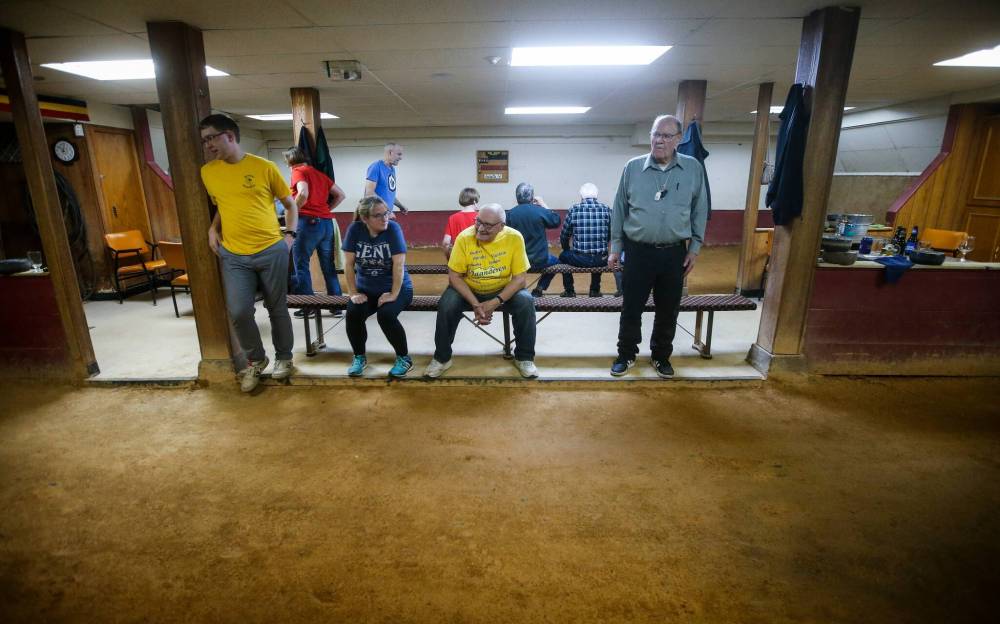
If it’s Tuesday night, Lisa Boone knows where her three kids, Josh, 25, Hannah, 23, and Theo, 21, are. The same way she used to accompany her father to the Belgian Club when she was a youngster, her children started tagging along with her on bowling nights, when they were still in grade school.
“I was probably eight, the first time I tried,” Hannah says, recalling how she used to bring her Barbie dolls along, in case she grew bored. “In the beginning, I had to use both hands to throw the bolles, they were so heavy, but I eventually grew out of that.”
Josh explains that there are three positions in Belgian bowling: lead, second and shooter. Just don’t let those designations trick you, his sister points out. Unlike curling, where teammates deliver rocks in the same order, end after end, that isn’t the case with rolle bolle. Any of the three can shoot at any time, depending on the situation, she says.
JOHN WOODS / WINNIPEG FREE PRESS Theo Wolchock smooths out the angle on a bolle. 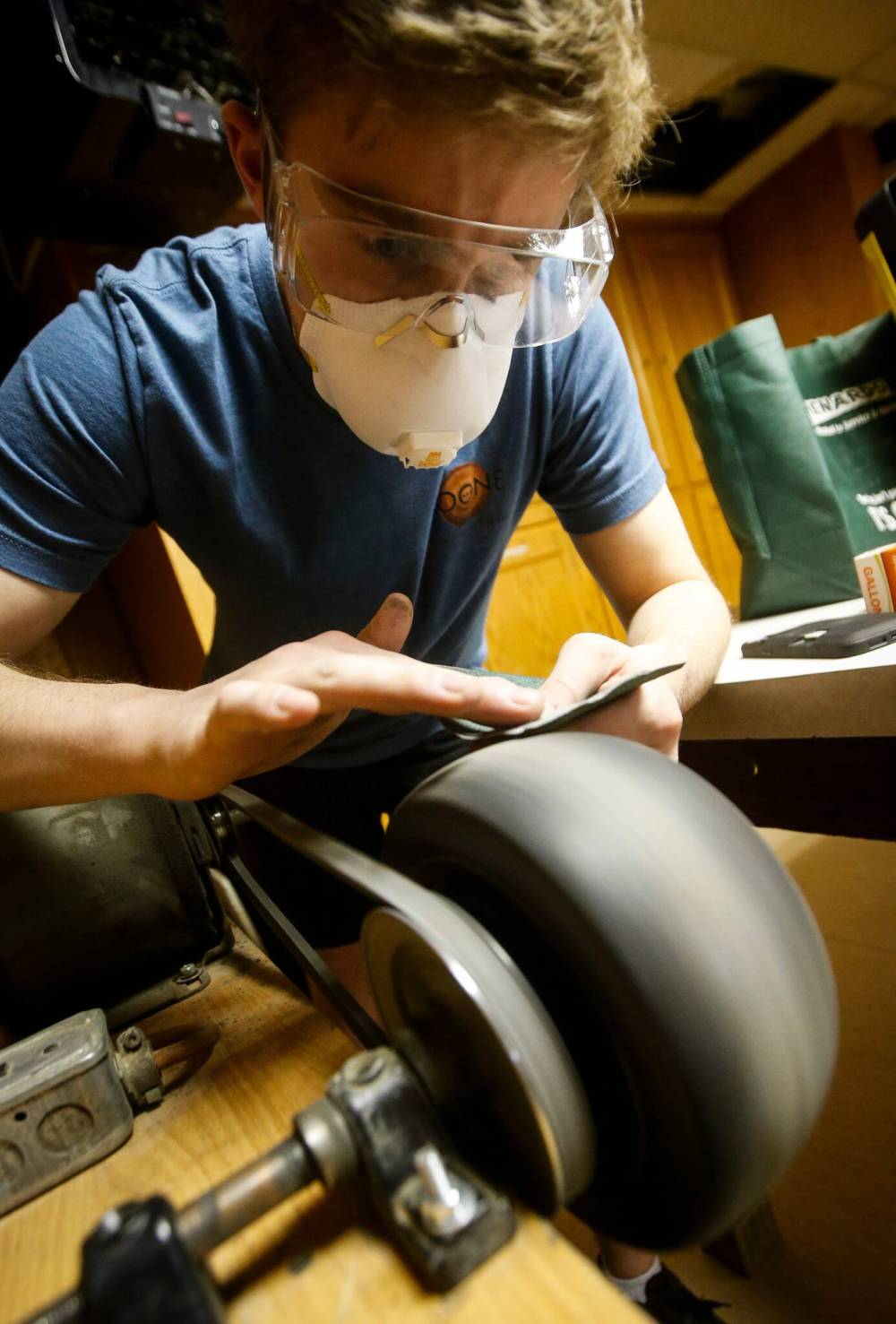
If, for example, if an opposing player goes first, and lands their bolle by the stake, the shooter, so-named for their take-out proficiency, can step up, to fire when ready.
“For that reason, there is a bit of strategy involved, because if you save your shooter for last, it might be too late (to score),” Josh says.
The family has travelled to Belgium a few times. On each occasion, they made a point of playing rolle bolle on its home turf.
“What was interesting was how it’s a bit of a niche sport over there, too,” Hannah says, noting she and her brothers are hoping to compete in a four-day tournament being held in Marshall, Minn., at the beginning of March. “Here, I’m not surprised that most people don’t have a clue about the game, but it’s not like you can stroll into Brussels and go ‘anybody bowling today?’ and automatically find a game. It’s definitely more of a Flanders thing.”
Between the two of them, George DeSerranno, 83, and Jean-Marie De Clercq, 86, have close to 150 years of rolle bolle experience.
DeSerranno, who took up the game at age 10, remembers a period when Winnipeg was a hotbed for the historic pastime, with organized groups participating regularly in Fort Garry, Tuxedo and Transcona. Even his father had a well-tended, grass alley on his farm property, just outside the city, he points out.
PHOTOS BY JOHN WOODS / FREE PRESS Hannah Wolchock, who has been playing since the age of eight, throws a bolle during Tuesday night action at the Belgian Club.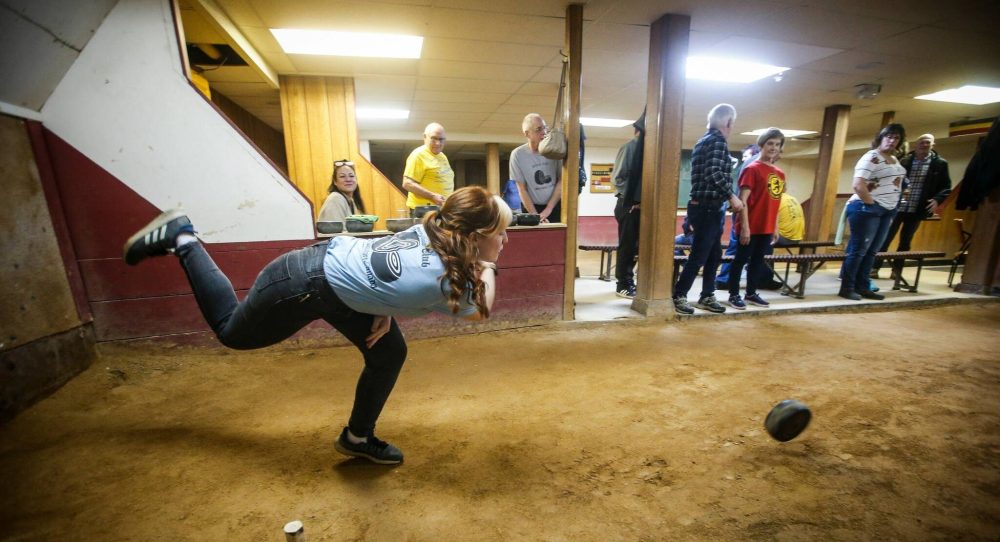
And while Belgian bowling remains popular in parts of the province such as Swan Lake, Mariapolis and Baldur, the Belgian Club is its final outpost in the city, DeSerranno says.
“It isn’t a physically taxing game, particularly if you’re like me and don’t throw very hard, so I can’t see a reason why I’d stop any time soon,” he adds. “I enjoyed loads of other sports when I was young, but this is the game I ended up sticking with.”
For his part, De Clercq learned the sport as a teenager, in his native Belgium. He moved to Winnipeg in 1968 at age 21 and was surprised to discover rolle bolle was contested here, as well.
“I was also surprised when I visited Detroit in the early ’80s, and saw a variation of the game called feather bowling, where they use a feather instead of a stake, as a target,” says De Clercq, who served as president of the Belgian Club from 1981 to 1991.
JOHN WOODS / WINNIPEG FREE PRESS Leah St. Laurent (left) and Hannah Wolchock check to see which team's bolle scored at the end of a round. 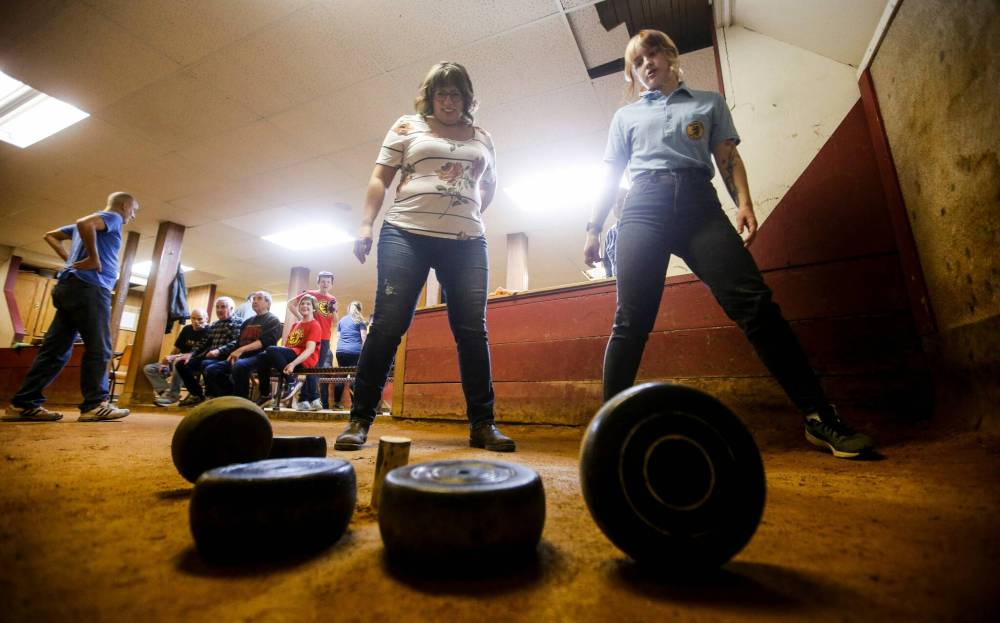
De Clercq stays in touch with friends and family in Belgium. Rolle bolle is one of the topics that comes up fairly often.
“I’m told there are certain leagues back home where the youths outnumber the adults, which is nice to hear, because that means the game will live on,” he says, responding he’ll be there in a sec, when told it’s his turn to shoot. “There’s one spot I used to bowl at that has close to 30 alleys, with seats for spectators. It’s not exactly the NFL, but people do go watch.”
david.sanderson@freepress.mb.ca
BOLLE-ING FOR DOLLARS
Roy DePauw took up the sport of rolle bolle in the mid-1970s, in his hometown of Geneseo, Ill., 250 kilometres southwest of Chicago.
Since 1952, a person in neighbouring Moline, Ill., had been turning out the puck-shaped bolles necessary for play, but after he died in 1972, area bowlers were thrown for a bit of a loop. Another person tried his hand at producing the tapered, rubber apparatuses, but he died a few years later, too.
“This was back when rolle bolle was really big in the area — there were tournaments every weekend with as many as 250 participants — so my dad said if we wanted to keep going, somebody’d better figure out how to make the bolles, and quick,” says DePauw, 69, when reached at home. “We spent a lot of nights at the library learning about rubber, then Dad started doing ’em on his farm, in 1977. He passed away in 1996, and that’s when I took over.”
DePauw presently ships bolles across North America, including to scores of snowbirds of Belgian descent who spend the winter months in Texas and Arizona. He has a few regular customers from Manitoba, to boot.
“There’s one guy who lives in Holland who comes to tournaments in Illinois, and whenever he does, he always goes home with two or three sets of bolles,” DePauw says, noting in addition to regular-sized bolles weighing between six and eight pounds, he also markets “baby bolles,” three-pound models for young children.
“I’ve been to your (Belgian) club up there, with my son and grandson. My last trip was right before COVID, and we stayed with friends of ours in Treherne. We bowled at the outside courts and I got first place that night, as a matter of fact.”
— David Sanderson
Dave Sanderson was born in Regina but please, don’t hold that against him.
Our newsroom depends on a growing audience of readers to power our journalism. If you are not a paid reader, please consider becoming a subscriber.
Our newsroom depends on its audience of readers to power our journalism. Thank you for your support.
